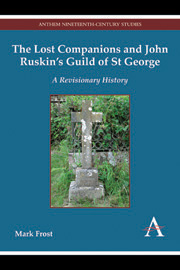Book contents
- Frontmatter
- Dedication
- Contents
- List of Illustrations
- Preface
- Frequently Cited Sources
- Introduction
- Chapter One Roots
- Chapter Two Glimpsing Eden: 1867–70
- Chapter Three ‘At Least a Beginning’: 1871–75
- Chapter Four Opportunities: 1875–77
- Chapter Five Dreams and Nightmares: 1878–81
- Chapter Six The Long Decline and the Great Dispute: 1882–1900
- Afterword
- Appendix Companions of the Guild of St George: Early Lists
- Notes
- Bibliography
- Index
Chapter Four - Opportunities: 1875–77
Published online by Cambridge University Press: 05 October 2014
- Frontmatter
- Dedication
- Contents
- List of Illustrations
- Preface
- Frequently Cited Sources
- Introduction
- Chapter One Roots
- Chapter Two Glimpsing Eden: 1867–70
- Chapter Three ‘At Least a Beginning’: 1871–75
- Chapter Four Opportunities: 1875–77
- Chapter Five Dreams and Nightmares: 1878–81
- Chapter Six The Long Decline and the Great Dispute: 1882–1900
- Afterword
- Appendix Companions of the Guild of St George: Early Lists
- Notes
- Bibliography
- Index
Summary
In the first Fors of 1876 Ruskin reflected again on personal woes and Company progress:
During these five years, very signal distress has visited me, conclusively removing all possibilities of cheerful action […] Also, everything I have set hand to has been unprosperous; much of it even calamitous;—disappointment, coupled with heavy money loss, happening in almost every quarter to me, and casting discredit on all I attempt […] I have not been able, for my own share, to accomplish the tenth part of what I planned. Under which conditions, I proceed in my endeavour to remodel the world, with more zeal, by much, than at the beginning of the year 1871.
(28.486)The first four years had yielded little in the way of concrete achievements, but a reinvigorated Ruskin entered the second phase of the organisation's existence. Referring perhaps to spiritualist dabblings at the Mount-Temples Broadlands estate, he confided to Norton on 27 January 1875 that ‘all you said about my being among wrong sort of people has come home to me in a deadly way lately’. He had been ‘an infinite ass to let myself drift as I have’ (37.160). To arrest this drifting in Guild work, he had to confront key difficulties. That he did so, and achieved a great deal in the next three years, made the Guild's second phase its most productive, but while summer 1875 saw him proceed with zeal, the organisation's middle period would in many ways be yet more ‘unprosperous’ and ‘calamitous’ than the first by creating conditions that threatened to cast even greater discredit on all he attempted.
- Type
- Chapter
- Information
- The Lost Companions and John Ruskin's Guild of St George , pp. 107 - 152Publisher: Anthem PressPrint publication year: 2014



